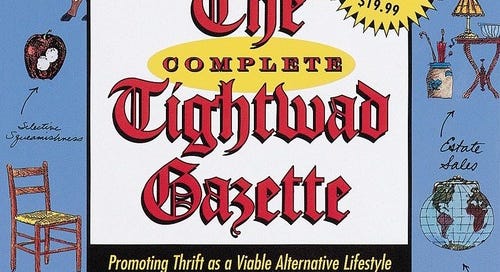A penny saved is a penny earned. —Ben Franklin
Let’s say you lose your job, your Social Security check stops coming, or the stock market crashes. The banks close and you can’t get at your 401k. A few months ago, you would have scoffed at me for saying that out loud. Not any more. Donald Trump’s tariffs and Elon Musk’s DOGE are leading us into very uncertain economic territory.
Now what?
It’s time to tighten our belts. Luckily, somebody has already given the art of penny pinching a lot of thought.
Back in pre-Internet days, a Maine housewife named Amy Dacyczyn (pron. decision) started an old-school, snail mail newsletter that went out to tens of thousands of subscribers: The Tightwad Gazette—and just in time, too, because a nasty recession was right on its heels. I was one of those subscribers.
The Tightwad Gazette newsletter was published from 1990-1996. Later, Dacyczyn gathered the issues up and published three books, The Tightwad Gazette(s) 1, 2, and 3, then consolidated them all (with updates) in 1998. In The Complete Tightwad Gazette: Promoting Thrift as a Viable Alternative Lifestyle, Dacyczyn provides a useful definition of tightwads for those who never heard the word before:
Tightwads are by nature unconventional. We push the normal limits to make things last longer: We reuse things in unusual ways. We experiment constantly to find new, cheaper ways to do almost everything.
At 927 pages plus a comprehensive, 32-page index, The Complete Tightwad Gazette is packed full of useful tips straight out of the old days and the Great Depression, when our ancestors knew how to squeeze a dollar “until the eagle grinned,” as a popular song lyric of the day went.
Thrift was prized back then, but it got lost somewhere along the way, along with many of the self-sufficient skills that helped families survive hard times. But with tariffs and other political hijinks expected to send prices up and up, we can learn those skills now.
Preserving and storing food (aka prepping) are the first line of defense to feed a family well on a bare-bones budget. Dacyczyn devotes several pages to canning and pantries, as well as creating a constantly-updated price book that compares item prices in various local grocery stores. The food you buy (and preserve) at today’s prices will feel practically free in a few months when you’re eating them for dinner instead of buying ingredients or expensive, packaged foods at tomorrow’s prices.
Even better than saving at the grocery store or farmer’s market is growing at least some of your own food — if you have the space to do so, outside or in. Tightwad Gazette offers advice from cold frames, composting, and container gardening to where to find Master Gardening courses, and even the uses of pantyhose in the garden (you can hang melons and pumpkins with it.)
What to do with all that stored food? No worries, there are dozens of recipes in the book.
There are plenty more tips for saving money than just groceries. Like travel for tightwads, a comparison of painting versus re-siding your house, thrifty window treatments, slashing your electric bill, cutting the cost of college, avoiding credit card debt, and much, much more.
It was published nearly thirty years ago, so some things like prices and contact info for ordering items are out of date, but the concept of frugality in hard times stays with you.
The Complete Tightwad Gazette is a reference book that deserves an honored place on the bookshelf, to be consulted over and over.






Thank you for reminding me of this. For many years this book helped my family get by, on a nothing salary. Now that I only have SSDI, it's definitely time to track this down again. Amy was inspirational, but so practical (with the exception of splitting the toilet paper into 2 - 1ply rolls. I drew the line there). Time to make a price book again and get serious.
Lavonne, thank you. Hopefully in the future I can show my appreciation with money!